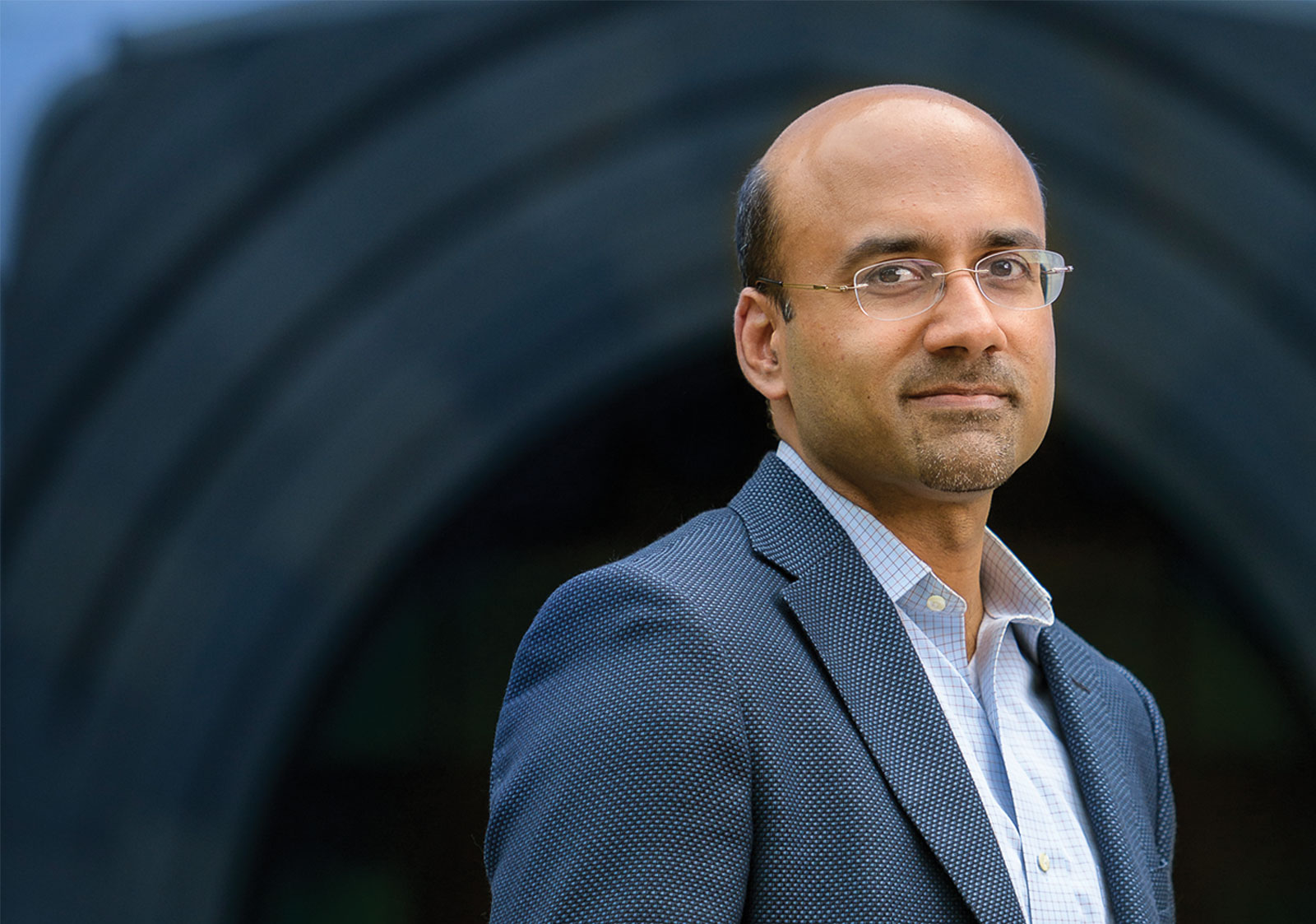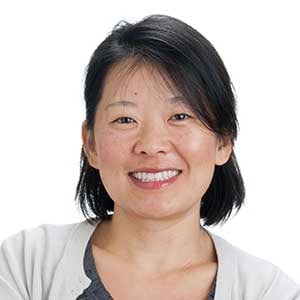Hyun-Sung Khang profiles Princeton’s Atif Mian, who sees the fight against inequality as a moral imperative

Everyone knows someone who buys more than he or she can afford. This has been characterized mockingly as millennials spending beyond their means on avocado toast and expensive lattes, often borrowing to fund those wants. But in the modern era, dependence on credit isn’t a sign of profligacy, according to Atif Mian, a Princeton professor of economics, public policy, and finance. Rather, he argues, excessive borrowing is evidence of an economic system that has become distorted by widening income inequality.
“It’s almost as though the modern economy has become addicted to credit,” Mian says. “We need to understand how, and why, that happened.”
The 44-year-old Pakistani-American has done much to shed fresh light on our modern-day addiction to debt, and in the process, to proffer a new thesis for the greatest economic downturn in more than half a century. He and coauthor Amir Sufi, a University of Chicago finance professor, offer a novel take on the Great Recession in their 2014 book, House of Debt. The book helped land Mian on that year’s list of the world’s 25 most influential young economists, compiled by the IMF.
The authors parse vast amounts of data to show that a dramatic rise in household debt among borrowers least able to repay helped precipitate the greatest global financial crisis since the Great Depression. In their book, they argue that policymakers erred by focusing excessively on the banking system and in bailing out banks, not borrowers.
Sufi says their research has helped put household debt much more prominently on the radar of the IMF, the Federal Reserve, the Bank of England, and central banks of Australia, China, and Israel.
In the five years since the book’s publication, Mian and Sufi have
broadened the scope of their research, focusing on household debt and
economic inequality. Their more recent work links the worsening of
household debt since 1980 to the rise of the
superrich. They connect increased income inequality to the concentration of
vast amounts of wealth, which has flooded the economic system with easy
credit that fuels consumption, rather than contributing to economic growth
through real investment.
Passion for efficiency
In broadcast interviews and in the presence of his coauthor, Mian’s quieter, more reserved style is overshadowed by his fluent, fast-talking writing partner. But in person, and away from the camera, Mian’s mildness comes across as kind, thoughtful, and charming. He brings an easily overlooked passion to the dismal science and is attracted by the allure of the greater efficiencies it promises.
“The reason I get so excited about economics is—and this is my definition of economics: how can we better organize ourselves to do something where the sum is bigger than the parts?” says Mian. “I think economics is the unique field that exactly focuses on those kinds of questions.”
Mian’s wife of almost 20 years, Ayesha, jokes that the pursuit of efficiency prevails even in his personal life, manifesting itself in an obsession with “space utilization around the house,” during frequent evenings hosting guests.
“If there’s a three-seater [sofa], he wants three people to sit on it,” she says with a laugh. “But if there are two people sitting comfortably on it, he sees it as inefficient. Small things like that, he cannot get out of his head.”
And if a third person fails to fill the allotted slot? “You can see the pain on his face.”
Mian came to economics by accident. Born into a solidly upper-middle-class family in Pakistan as the only son of government physicians, Mian typically would have been expected to become either a doctor or an engineer, he says. As he had no interest in medicine, he chose engineering. Such was the value the family attached to education that Mian’s mother moved to Lahore, Pakistan’s second largest city, for the children’s education while his father remained posted a couple of hundred miles away.
At the age of 17, encouraged by his father, the young Mian applied to a handful of US schools and won a full scholarship to study electrical engineering at the Massachusetts Institute of Technology. He describes receiving MIT’s letter of acceptance as “one of the happiest (and luckiest) moments of my life.”
MIT was Mian’s first real exposure to life outside Pakistan and his first experience of independent living. Although he was a diligent student, engineering didn’t inspire him. Mian switched to mathematics and computer science and stumbled across economics while fulfilling his humanities requirement.
He saw in economics a field of study where he could address the big sociopolitical questions growing out of his childhood in 1980s Pakistan, a nation emerging from dictatorship, riven by violence, extremism, and internal sectarian tensions.
“You’re sort of wondering, like, is this really how the world is supposed to work in terms of the violence, in terms of the way the society seems to be splitting apart, and can one do better?” Mian says. “That was something that always resonated with me, that I wanted to do something about.”
After completing his undergraduate degree in mathematics and computer science with a perfect grade-point average and following a short sojourn at Princeton, Mian opted to return to MIT for his PhD. He earned his degree in 2001 with a dissertation on banking and governance. He then served as an assistant and associate finance professor at the University of Chicago business school until 2009 and as a professor of economics, finance, and international business at the University of California, Berkeley, until 2012, before coming to Princeton.
Research partnership
The partnership with Sufi, a Pakistani-American born in Detroit and reared in Topeka, Kansas, emerged from an introduction by a mutual friend, who suggested they had similar interests. According to Sufi, that interest was in “using applied microeconomic techniques to answer important questions at the intersection of finance and macroeconomics.”
It is this use of micro, or granular, data to answer macroeconomic questions that the authors view as their special contribution to economics. “This empirical approach has really taken off since our early work on the 2008 recession,” says Mian.
From that shared interest grew their book, which was short-listed for the Financial Times 2014 Business Book of the Year, although Thomas Piketty’s Capital in the Twenty-First Century ultimately won.
Former US Treasury Secretary Larry Summers suggested that the work “could be the most important book to come out of the 2008 Financial Crisis and subsequent Great Recession.” In a review, Summers expresses some sympathy for the authors’ assertion that there should have been greater consideration given to households during the Great Recession.
In discussions with Mian, there is almost a sense of a philosophical underpinning to his work, a belief that the well-being of a community or society depends on all individuals thriving. “When we talk about stuff like the Great Recession, you know, it really matters that we are able to absorb each other’s shocks, that we realize how we’re all ultimately connected to each other,” he says.
Summers agrees that all future work on financial crises will have to consider household balance sheets. At the same time, he defends the policymakers of the day.
“Mian and Sufi’s error is a common one among academic economists, many of whom are unwilling to try to understand policy choices that arise from considerations outside simple models,” Summers writes.
“This is exactly the kind of political timidity and failure to understand the gravity of the situation that has led to these kinds of problems,” retorts Mian.
Mian and Sufi write that policymakers could have done a better job of managing the financial crisis if they had facilitated bailouts for indebted households. The authors are sharply critical of the determination to rescue banks at the expense of households that were underwater.
“You could have said to the banks: ‘We, the central bank and the Treasury, we are giving you free money. You must pass that on to the borrower,’” Mian says. In addition, the government could have ordered a moratorium on house foreclosures. “There was no one to absorb the 4 million homes that were actually put on the market by banks.” Mian knows that because the data tell him so.
Data is always king, wife Ayesha says, but Mian is open to reasoned argument. When their two young daughters resisted attending a private school on the grounds that it was elitist, they spoke to their father and explained their views.
His response, according to Ayesha, was “There’s no way we are sending the girls there. As long as they give me a good reason, I’m OK with any decision they make.”
The two have known each other from a young age. They married in Lahore after Mian visited Pakistan to propose. Ayesha describes her husband as very serious and straightforward. Even as a student in his early 20s, “it was like talking to a 40–45-year-old.” She describes their early relationship as “practical” and “pragmatic.” “The romance came later,” she says.
Late last year, their 14- and 12-year-old daughters were joined by a brother. According to Ayesha, with the security of tenure and a major publication under his belt, Mian is relishing this third experience of fatherhood.
“He’s always been a phenomenal father, but now he’s lightened up more and is much more accessible,” she says.
Inequality and household debt
Mian’s and Sufi’s work on debt focuses on the reasons for and consequences of the steady and continued rise in debt relative to GDP. At the beginning of the 1980s, debt to GDP in the United States was about 30 percent. Since then, the figure has ballooned to more than 100 percent, a pattern duplicated in countries around the world.
The metanarrative the researchers are now exploring is the notion that the wealthiest in societies around the world make more money than they can possibly spend consuming. Rather than funding investment, the surplus is channeled through financial markets for lending to fuel consumption, Mian says.
“We’ve become a global economy dependent on credit creation to generate sufficient demand for growth,” he says.
With ever-increasing credit flowing through the system, to encourage more borrowing, interest rates are driven lower and lower, Mian suggests. But with interest rates at record low levels, there is a limit to how much further they can fall, creating the current liquidity trap, with low growth bedeviling countries around the globe. Mian suggests ominously that this credit “supercycle” is nearing an end.
From this thesis flow dismaying sociopolitical repercussions, including growing inequality, widespread discontent, and angry populism around the world, Mian says.
“You now have a relatively struggling global economy, against the background of more inequalities and inequities,” he says. “And so that raises political tensions. There’s something wrong. People sense that, and they want answers.”
Mian identifies unequal growth as the “fundamental disease” behind this credit supercycle, leading to a sense of disenfranchisement from society. The social costs are high and far-reaching. He cites examples ranging from child hunger in the United States, to high incarceration rates among black men, to low public investment in infrastructure.
“If you were to come from Mars and look at this situation, you would say, ‘What? Are these people crazy?’” Mian says.“‘They are forgetting millions of their population who have huge potential to make a difference; they are literally throwing them off the curbside.’ To the extent people like me matter, I see our role as trying to convey what is happening and why it’s happening.”
Inclusive prosperity
While pondering these questions, Mian became embroiled in a bitter, personal controversy in his native country. Last September, Pakistan’s newly elected Prime Minister Imran Khan named Mian to the Economic Advisory Council. Though widely praised internationally, Mian’s nomination was vehemently attacked by the religious right in Pakistan because of his membership in the minority Ahmadi religious community. After three days of street protests, the government reversed its decision. It was a bitter disappointment to Mian, who was looking forward to being of service to a country he loves.
Mian’s research, fueled by moral conviction, has led him to passionate advocacy for the fruits of growth to be shared more widely because, he says, economics shows us that our fortunes are linked.
Earlier this year, he added his name as one of 11 founding members of “Economics for Inclusive Prosperity,” a network of economists pledged to come up with policy solutions that will generate prosperity for all.
“While prosperity is the traditional concern of economists, the ‘inclusive’ modifier demands both that we consider the interest of all people, not simply the average person, and that we consider prosperity broadly, including nonpecuniary sources of well-being, from health to climate change to political rights,” the group’s website declares.
The reason for his support of the group? “Because we are all in it together,” Mian says. “Whatever ‘it’ is, we are all in it together.”
Opinions expressed in articles and other materials are those of the authors; they do not necessarily reflect IMF policy.








